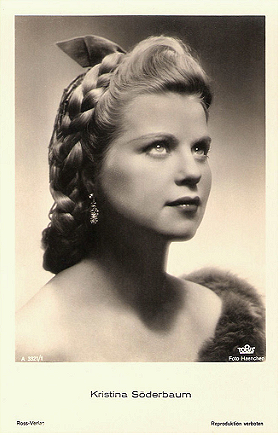Description:
Beata Margareta Kristina Söderbaum (b. September 5, 1912 in Stockholm, Sweden, d. February 12, 2001, Hitzacker, Lower Saxony, Germany) was a Swedish-born German film actress, producer, and photographer. She is most known for her roles in Nazi-era films.
Her father, Professor Henrik Gustaf Söderbaum (1862–1933), was the permanent secretary of the Royal Swedish Academy of Sciences.
After both her parents had died shortly after each other, she moved to Berlin and enrolled in a theatre school.
Beginning in 1935, Söderbaum starred in a number of films with her husband, director Veit Harlan, whom she married in 1939. Har
Beata Margareta Kristina Söderbaum (b. September 5, 1912 in Stockholm, Sweden, d. February 12, 2001, Hitzacker, Lower Saxony, Germany) was a Swedish-born German film actress, producer, and photographer. She is most known for her roles in Nazi-era films.
Her father, Professor Henrik Gustaf Söderbaum (1862–1933), was the permanent secretary of the Royal Swedish Academy of Sciences.
After both her parents had died shortly after each other, she moved to Berlin and enrolled in a theatre school.
Beginning in 1935, Söderbaum starred in a number of films with her husband, director Veit Harlan, whom she married in 1939. Harlan and Söderbaum made ten films together under Joseph Goebbels.
According to Antje Ascheid, Soderbaum is frequently identified as "most singularly representative of the Nazi ideal, as the quintessential Nazi star." As a beautiful Swedish blonde, Söderbaum had the baby-doll looks that epitomized the model Aryan woman. In fact, she had already played the role of the innocent Aryan in a number of feature films and was well-known to German audiences. Her youth and beauty made her a symbol of health and purity and thus an exemplary specimen of the Nazi ideal of womanhood.
In a number of her films, she had been imperiled by the threat of "rassenschande" ("racial pollution"). Two such roles were Dorothea Sturm, the doomed heroine of the antisemitic historical melodrama Jud Süß, who commits suicide by drowning after being coerced into having sex with the villain and Anna in Die goldene Stadt, a Sudeten German whose desire for the city (in defiance of blood and soil) and whose seduction by a Czech result in her drowning suicide. As a result of her watery fate in these two films, as well as a similar end in her debut in Harlan's 1938 film Jügend, she was given the mock honorary title Reichswasserleiche ('Drowned Corpse of the Reich').
Other roles included Elske in Die Reise nach Tilsit, the wholesome German wife whose husband betrays her with a Polish woman, but finally returns, repentant; Elisabeth in Immensee, who marries a rich landowner to forget her unrequited love, and in the end decides to remain faithful even after she is widowed and her lover returns; Aels in Opfergang, a woman who dies after her love affair; Luise Treskow in The Great King, a miller's daughter who encourages Frederick the Great; and Maria in Kolberg, a peasant girl who loyally supports the resistance to Napoleon and is the only survivor of her family.
In the first few years after the war, Kristina Söderbaum was often heckled off the stage and even suffered the indignity of having rotten vegetables thrown at her. In subsequent years, she frequently expressed regret for her roles in anti-semitic films.
After her husband was again permitted to direct films, Söderbaum played leading roles in a number of his films. These included Blue Hour (1952), The Prisoner of the Maharaja (1953), Betrayal of Germany (1954) and I Will Carry You on My Hands (1958). Their last joint project was a 1963 theater production of August Strindberg's A Dream Play in Aachen.
After Harlan's death in 1964, Söderbaum became a noted fashion photographer. In 1974 she took a role in Hans-Jürgen Syberberg's film Karl May. In 1983 she published her memoirs under the title Nichts bleibt immer so ("Nothing Stays That Way Forever"). In her later years, Söderbaum faded into obscurity but still took roles in three movies and the television series The Bergdoktor. Her last film was with Hugh Grant in the thriller Night Train to Venice in 1994. She died in 2001 in a nursing home in northern Germany.
... (more)
(less)
My tags:
 Add tags
Add tags
 10 comments
10 comments 10 comments
10 comments




 Login
Login




























